| Главная » Файлы » "The Box of Antiquities" » Five colors of Druze |
"The Box of Antiquities" - Five colors of Druze
| 30.10.2012, 21:24 | |
Prophet and usurper in the El-Hakim palette Old Druze man (Wikipedia)
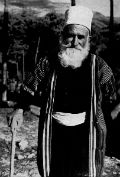 "The terrible Druze sect”, a hero of the famous novel by Umberto Eco "Foucault's Pendulum" says about them. "The terrible Druze sect”, a hero of the famous novel by Umberto Eco "Foucault's Pendulum" says about them. Actually, it’s difficult to find another faith, which is associated with such disgusting and striking horror legends as the Druze religion. Authors of numerous 19th century researches alleged: at their secret gatherings the Druze worshiped the calf's foot, had orgies; their conversations consisted of mysterious words-symbols. And what is more, they had secret ties to Frankomasons, whom they called "associated friends” and "Lebanon sovereigns”. Only few could believe today in such nonsense, but the Druze present nowadays one of the most unique and mystical religious movements. They are an amazing fragment of the unchanged and distant past. They try to combine mysticism and rationalism in the Islamic culture. The faith was founded by Hamza Ben-Ali, a Persian mystic and scholar at the court of Caliph El-Hakim. Born at the end of the first millennium, in the 985, he came to Cairo at the age of 20 and soon became a favorite of the powerful monarch. Those were strange and contradictory times for the Fatimid Caliphate and El-Hakim was its best exponent. A despot, who aspired after justice and prosperity, he fought with fire and sword against greed, debauchery and permissiveness in the Egyptian society. He built libraries, universities, hospitals and mosques, and at same time enforced asceticism, prohibited public baths and killed dogs in Cairo streets. El-Hakim showed open contempt for money and patronized religious ideas. Captured by Hamza Ben-Ali’s ideas, El-Hakim proclaimed him the creator of the new spiritual movement and the first imam. The new faith that cultivated modesty and abstinence of worldly pleasures was to become an alternative to the atmosphere of debauchery and moral degradation in the caliphate. Ben-Ali movement began to spread quickly in Egypt and the entire Islamic world. It was destroyed by impetuous arrogance of Ben-Ali’s follower Nashtakin ad-Darazi. When Ben-Ali’s disciples got rid of the heretic, it was already too late. The ad-Darazi cult had put down deep roots among his followers. They attached the name of the controversial preacher to the new sect and it has stuck with them ever since. El-Hakim’s death was a great blow to the Druze. His successor was not inclined to encourage the new religious movement and the community was exposed to repression in Egypt and around the Middle East. Muslim rulers united with Byzantium in their persecution of the heretics. In Antioch the Druze were subjected to total genocide. At the same time, Baha El-Din assumed leadership of the Druze. He sent the remnants of the Druze communities to South Lebanon, Syria and Galilee. After two decades of building strong new communities in the Levant, Baha El-Din declared that the sect would allow no outside converts to their religion: one must be born into the Druze faith. The tenets of the Druze religion are secret and mysterious, even to many Druze themselves, since the faith allows only a limited number of elite men and sometimes women, to study and learn all of its aspects. Those secrets and myths aroused hostility of Muslims and local Christians. The myths were spread all over the world by European travelers and missionaries. In the thirties of the 19th century Egyptian soldiers of Ibrahim Pasha, and two dozen years later the Maronites, stole from the Druze their religious books and sold them to French travelers. But Europeans couldn’t decipher the allegories contained in those books. Dreadful stories about the Druze sectarians continued to spread throughout educated Europe up to the post-war time. Color of Truth Sheikh Muafak Tariff & his residence (AUTHOR PHOTO)
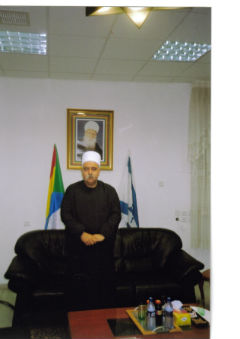 "We belong to a monotheistic religion, which sprang from Islam a thousand years ago”, explained the spiritual leader of the Druze community Sheikh Muafak Tariff, when we met in his residence in Acre. He was standing under the portrait of his father, the grey-bearded Sheikh "We belong to a monotheistic religion, which sprang from Islam a thousand years ago”, explained the spiritual leader of the Druze community Sheikh Muafak Tariff, when we met in his residence in Acre. He was standing under the portrait of his father, the grey-bearded Sheikh 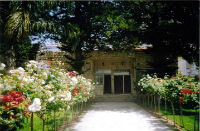 Amin Tariff who had been the religious leader of the community for 68 years. Muafak is his father’s successor. Born in Julis village in Northern Galilee, the father of seven, Muafak has already been the head of the community for 12 years. With flowing black caftan on and traditional Druze white head gear, stout and massive, he replies to my questions briefly and composedly. There are two flags near him: the blue and white flag of Israel and the Druze one that combined from 5 colors: red, yellow, blue, white and green. Each color pertains to one of the Druze saints and is a symbol. Amin Tariff who had been the religious leader of the community for 68 years. Muafak is his father’s successor. Born in Julis village in Northern Galilee, the father of seven, Muafak has already been the head of the community for 12 years. With flowing black caftan on and traditional Druze white head gear, stout and massive, he replies to my questions briefly and composedly. There are two flags near him: the blue and white flag of Israel and the Druze one that combined from 5 colors: red, yellow, blue, white and green. Each color pertains to one of the Druze saints and is a symbol. Each color pertains to a symbol defining its principles. White color means moral law, purity and strictness, honesty, faith and good intention. Adherence to truth is the basis of the Druze ethics. In contrast to Christianity and Islam a Druze priest doesn’t pardon his parishioners of hypocrisy and deception. A sinner continues to live in the community with the burden of shame on his conscience. Two sins are considered to be the heaviest: murder and adultery. Having committed them, a person will be stigmatized for the rest of his life.
The Druze strongly reject vices and bad habits, to which the leading religions shut their eyes. "Drugs, spirits and smoking are banned. Gluttony is considered a sin. Modesty and temperance are the basics of our community life”, Muafak continues. The Druze live in accordance with the traditional laws. "If a person neglects the norms of behavior, he breaks off with the community. Having cut the connection he can never return”. Deep faith is an inherent part of the Druze life. They believe in coming of Judgement Day, paradise full of purity and true knowledge, and hell where ignorance and spiritual blindness rule. God determines the fate of every human being, puts him through his facings on his life’s way. They believe that all is predetermined: date of birth and date of death, diseases and conditions of life. Nobody must repine against his fate. He belongs not to himself but to the Eternity and derives strength from it. "We believe in One God, our main prophet is Jethro (Shuaib), Moses’ father-in-law. The tomb of Jethro is situated near Tiberias, and his birthday is celebrated in April. We, like Muslims, believe in Moses, Jesus and Muhammad”, Muafak Tariff tells me. Besides, the Druze worship other prophets: Elhader Elijah, Aiub, Yosef, Sabalan and others. According to their belief God is present everywhere and there is no necessity in special religious ceremonies. It is important to appeal to the Most High, no matter where and when. Still the Druze have their own prayer halls – Hilwe. These are plain constructions with spacious room divided into two for men and women. Imam (religious mentor) conducts services. "The Druze society”, says Muafak, "is divided into enlightened guardians of teaching ("Ukal”) and uninitiated ("Juhal")”. The latter can join the bearers of knowledge but first they must fundamentally change their ways of life. Sheikhs examine closely the past of the person and let him join ranks in case he deserves it. Color of mystery Holy place & Imam in Yrka village (AUTHOR PHOTO) 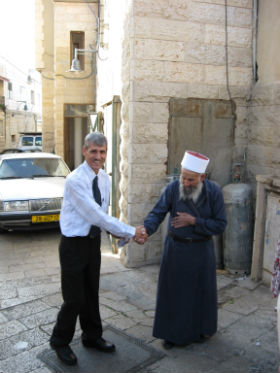 Blue is the color of eternity, mystery, expressed in the eternally blue skies and ocean and the human enigma. Mysticism envelops the Druze religion. A human soul, leaving the body, finds its haven in a newborn, they believe. The belief in reincarnation is Blue is the color of eternity, mystery, expressed in the eternally blue skies and ocean and the human enigma. Mysticism envelops the Druze religion. A human soul, leaving the body, finds its haven in a newborn, they believe. The belief in reincarnation is 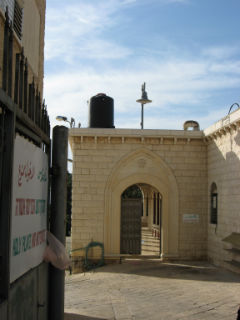 the basis for extraordinary steadfastness and strength, inherent to the Druze. They have no fear of death. They think that people who die by natural causes don’t preserve memory about the events of their last life unlike those who perished be violent and sudden way. The latter in their new lives remember their relatives, whom they’ve left, places, where they’ve lived and events of their previous life. In Druze villages you can meet numerous witnesses of reincarnation and hear endless stories about it. the basis for extraordinary steadfastness and strength, inherent to the Druze. They have no fear of death. They think that people who die by natural causes don’t preserve memory about the events of their last life unlike those who perished be violent and sudden way. The latter in their new lives remember their relatives, whom they’ve left, places, where they’ve lived and events of their previous life. In Druze villages you can meet numerous witnesses of reincarnation and hear endless stories about it. A girl in one of Galilee villages near Carmel continued to call unfamiliar names and tell detailed stories about strangers. She thought she had been a 70-year old woman in her last life. She had a family: a husband, nine sons and two daughters. Once, while working in the field she decided to have a rest, fell asleep and was run over by a tractor. The parents of the child inquired in the nearby villages and found the family, where the similar disaster had happened. When the members of this family came to Carmel the girl recognized them immediately. She called them by names, embraced and asked about their life. After that she, with her parents, went to the village, where she "had lived” for 70 years, and stopped near "her” house. Belief in reincarnation helps the Druze not to be afraid of death, sufferings and losses. They think that reincarnation lets human souls experience all possible life situations: from wealth, power and abundance to misery, humiliation and disasters. The Druze community endured extreme hardship in its history. During numerous religious wars in Lebanon a proverb was popular among young Druze fighters: "It would be wonderful to test hot milk again!” For a Druze, this ordinary sentence means: "It would be wonderful to die, be born again and taste mother’s milk”. Color of life Green is the color of the land, where the Druze are rooted. It also is the color of openness and readiness to change. Even those who live in big cities like Haifa, come back to their villages for weekends. All young Druze learn and master new professions. However, they don’t leave their villages but build houses near the houses of their parents. More and more young people in the Druze community strive for higher education. Several years ago the branch of Lincolnshire and Humberside University in the Druze village of Daliat El Carmel was established. Color of home Druze woman (Wikipedia) 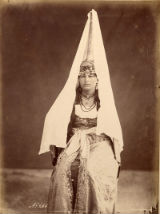 Yellow is the color of sun, light, and produce from the land; generosity and prosperity. The Druze are very hospitable. At the beginning of the last century European diplomats described that during the years of drought and poor harvests on the plain Maronites and Muslims came to the Druze for help and were not denied it. Yellow is the color of sun, light, and produce from the land; generosity and prosperity. The Druze are very hospitable. At the beginning of the last century European diplomats described that during the years of drought and poor harvests on the plain Maronites and Muslims came to the Druze for help and were not denied it. A Druze woman is the source of happiness and harmony. In contrast to many other religions, women are treated with a lot of respect. "A man can have only one wife, and the role of the woman in the family is very important”, says Muafak Tariff. "A marriage can be cancelled by the Druze court because of unfair or cruel treatment of the woman”. The well-being of children is the most important part of family life. The number of children in a family is not as important as the quality of their life. "Why give birth to children if you cannot provide for their education and decent life?” Tariff asks. Color of Honor Red color stands for strength, courage, pride and eternity. Thanks to the principles of their faith, the Druze have a reputation of reckless and noble warriors. "With such fighters I could have conquered the world!” Those were the words of Mahmud Pasha, the Ottoman army’s commander, who was admired by the Druze resistance in the clashes of 1890. It is interesting that Druze warriors had never allowed themselves to rape women in the enemy villages. The Druze are proud of their loyalty to those people with whom fate has connected them. This is the ancient tradition of the community. "The Israeli Druze are loyal to Israel”, Tariff says. Those Druze who live on the Golan Heights remain loyal to Syria, although the Golan belongs to Israel now. The Druze are loyal to the Jewish state though they think that they are being treated unfairly, with latent discrimination. Sometimes the Israel government openly neglects their needs. Some of their villages have no electricity, sewerage or decent roads. "We had defended the first Jewish settlers before Israel was established. 85% of the Druze youth enlist in the army voluntarily, while among the Jews only 75% do”, Tariff says with irony. The Druze have other reasons for feeling offended by Israel. After the military operation "Peace to Galilee” in Lebanon in 1982 Israel patronized the local Maronites. The latter using the advantage, started to take out on the Lebanese Druze. The government in Jerusalem changed its position only after mass protests among the Israeli Druze had started. Nevertheless, the Druze are perhaps the only community in Israel that is loyal to the state. "Our friendship is sealed with blood shed in wars”, says Muafak Tariff. The Druze have never attempted to establish their own political party. Nor have they ever been in opposition to the government, as the Arab members of the Knesset. Moreover, the Druze Knesset members traditionally present the two leading parties in Israel: "Likud” and "Avoda”. Does it mean that they cannot look out for themselves? Quite the opposite. Their "main concern” is to avoid duplicity, treason and disgrace in this life because a human being belongs to Eternity and God and not to himself. | |
| Просмотров: 687 | Загрузок: 0 | Рейтинг: 3.0/1 | |
| Всего комментариев: 0 | |
